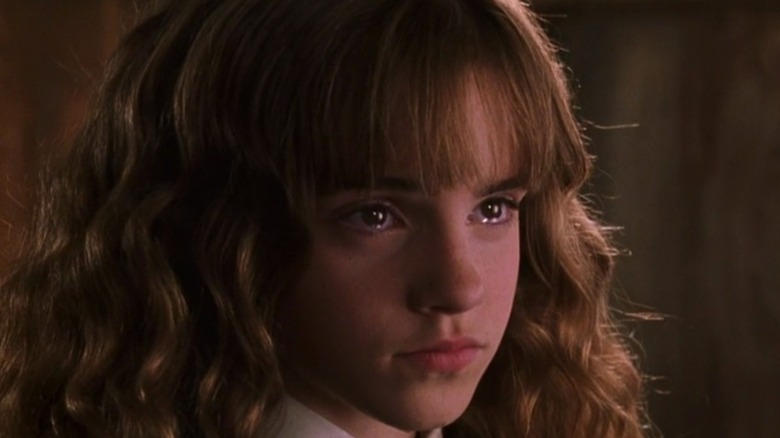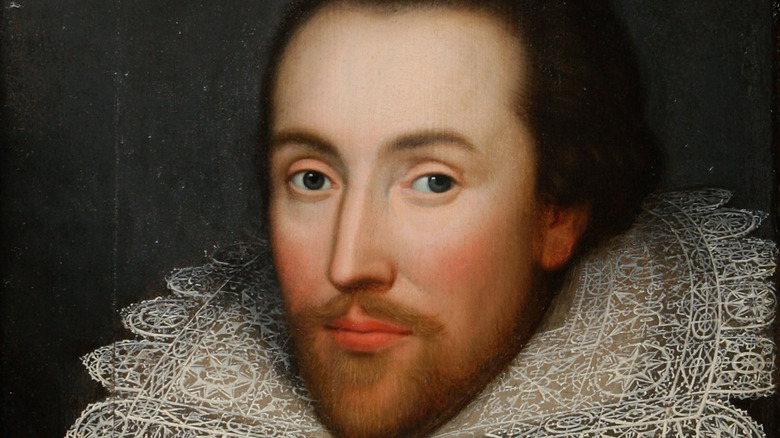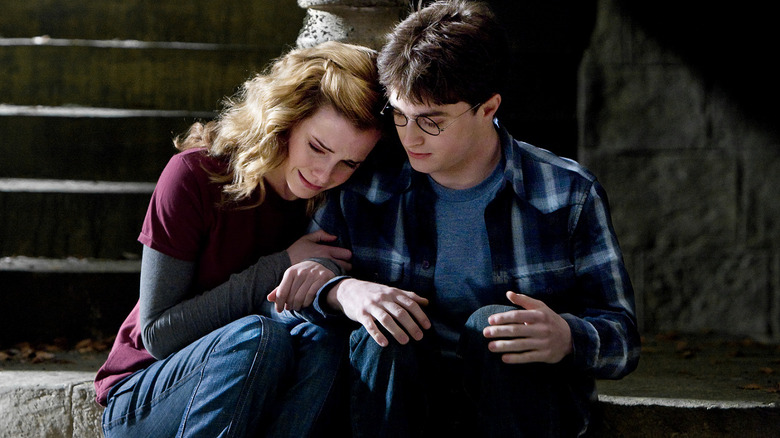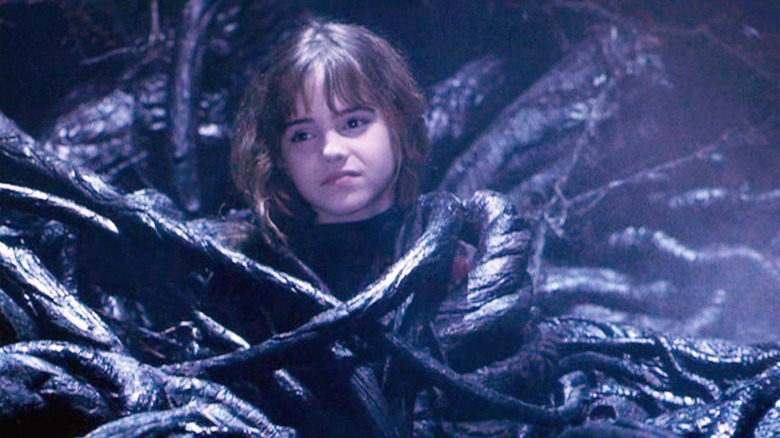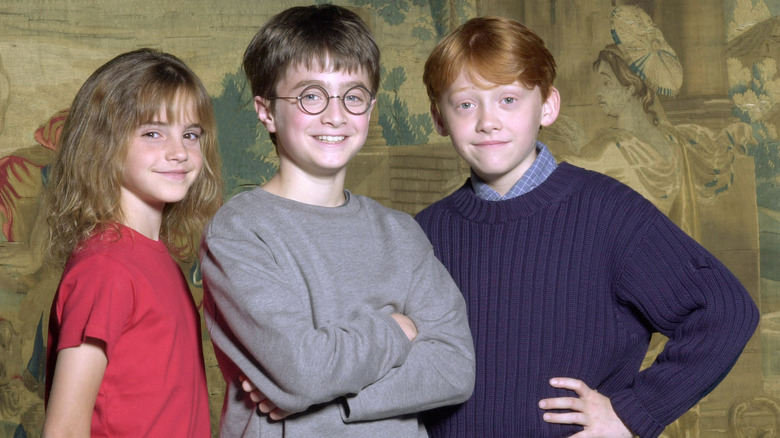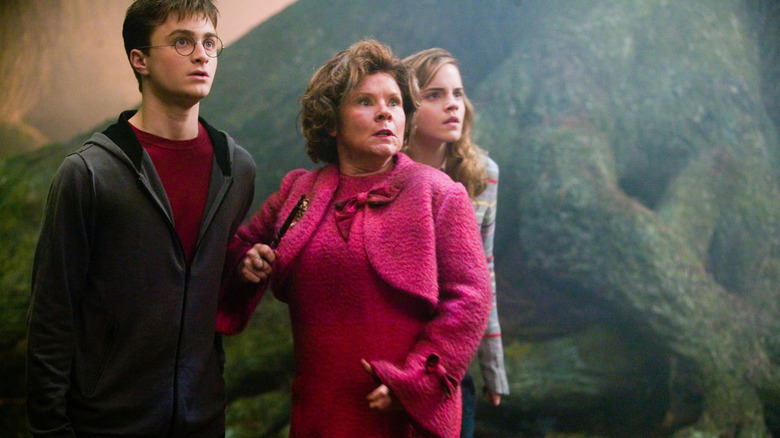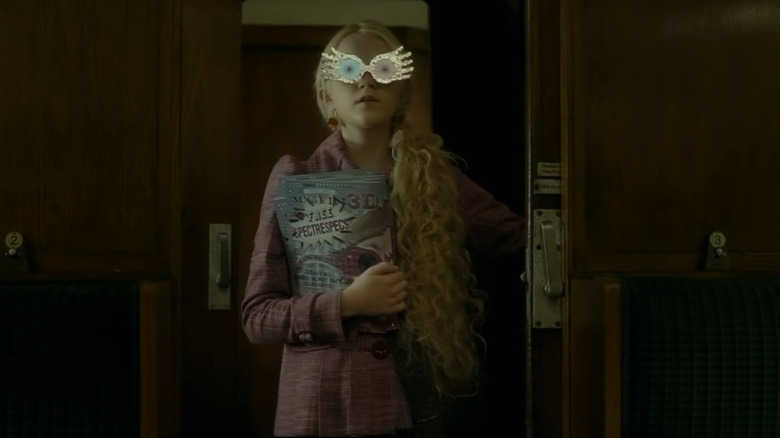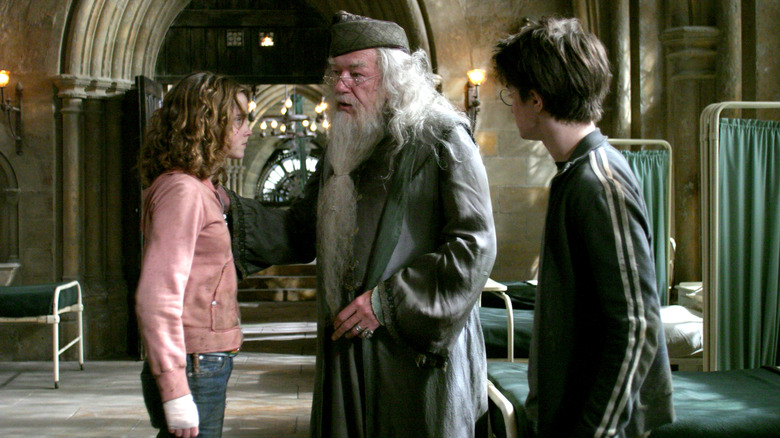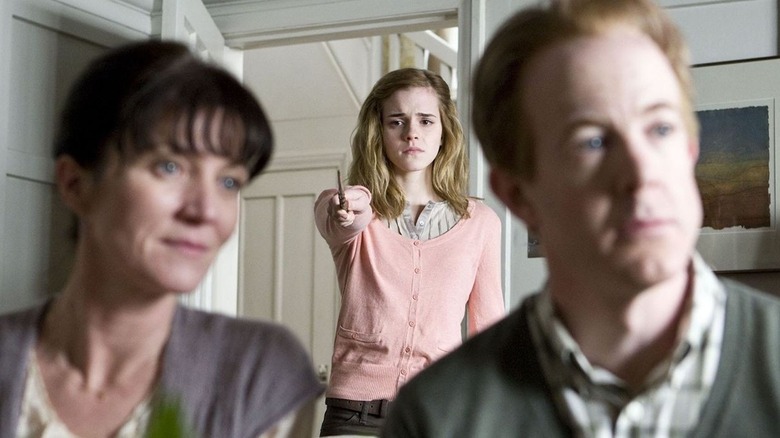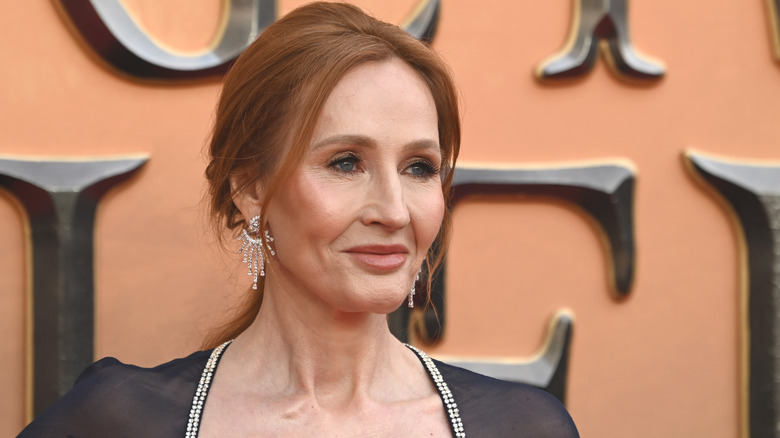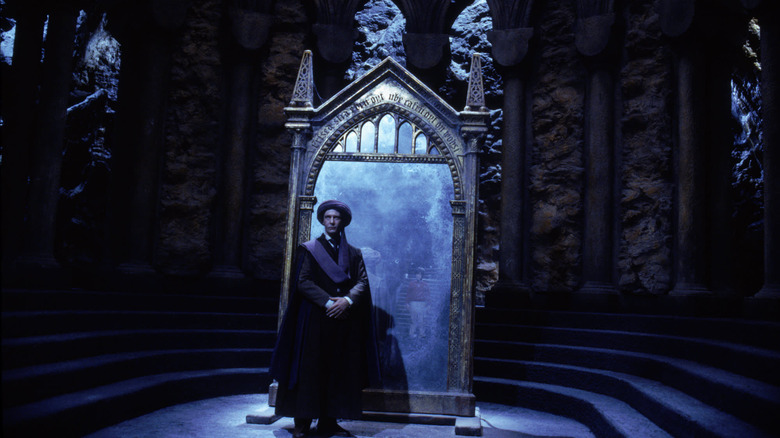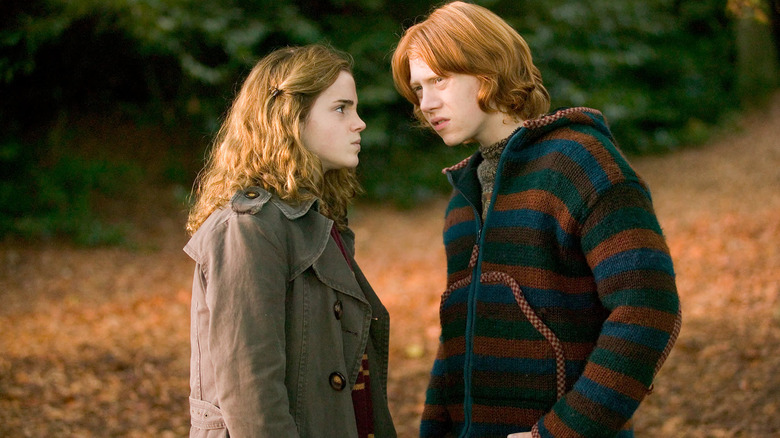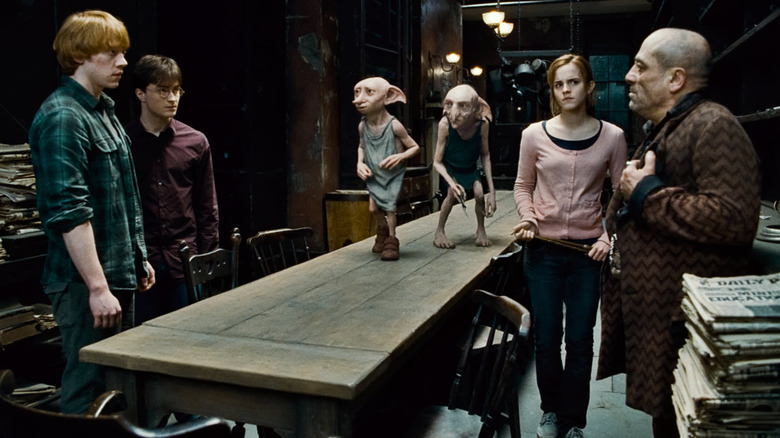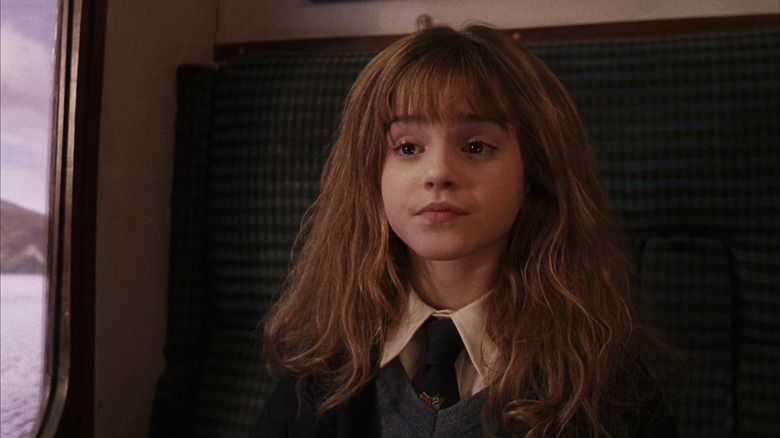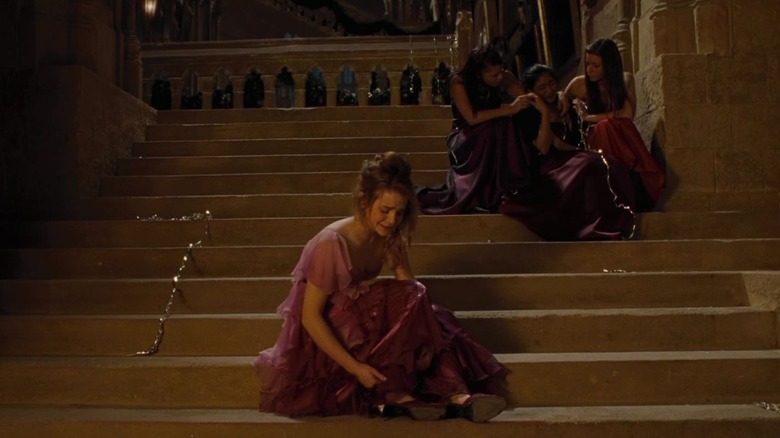What Fans Don't Know About Hermione Granger
Ever since the release of the first novel by author J.K. Rowling in the "Harry Potter" series back in 1997, the world has followed spellbound the adventures of the titular young hero as he discovers he can do magic and enrolls at Hogwarts, School of Witchcraft and Wizardry. Across seven books, eight movies, and numerous adaptations in different mediums, Harry Potter became one of the most popular heroes in the history of fiction.
While Harry is the engine that drives the plot of the franchise, two other characters that are a near-constant presence at his side are his best friends Ron Weasley and Hermione Granger. As the brains of the group, and the smartest witch of her age, Hermione serves as a particular source of inspiration for female fans.
Being raised in a non-magical (muggle) family, Hermione has marked thirst for absorbing all the knowledge Hogwarts has to offer. Time and again she has proven herself a loyal friend and a courageous soldier in the war against the dreaded dark wizard, Lord Voldemort. While fans are familiar with the broad strokes of Hermione's personal backstory, here are some facts about the character that fewer people are aware of.
The name game
The global, enduring success of the "Harry Potter" series has served to normalize just how unusual Hermione Granger's first name is. Sure, it might have become a popular trend in the last two decades for parents to name their newborn daughters Hermione, but back when the series was just starting to blow up, readers were not even sure how to pronounce the name properly.
J.K. Rowling herself had to personally wade into the debate when she clarified that it is pronounced "Her-my-oh-nee." So what's the story behind the unusual name? "Hermione's name is from Shakespeare's 'A Winter's Tale,'" Rowling explained in a 1999 interview for National Press Club (via Accio Quote!).
According to the author, while Hermione Granger bears little resemblance to her namesake in "A Winter's Tale," the in-story explanation is that her parents, who are both successful dentists "who liked to prove how clever they were," chose the unusual name for their daughter as a means of setting her apart from the crowd. Little did Mr. and Mrs. Granger know that their daughter's first name would become the least unusual thing about her, once she discovered her magical heritage.
The missing sister
Siblings play an important role in the "Harry Potter" series. On the one hand you have Harry's quasi-brother Dudley Dursley, his cousin who made Harry's life a living hell growing up together. On the other hand you have the Weasley family with Ron and his six siblings who all love and support each other unconditionally (except Percy, who straight-up sucks).
Only Hermione in the main trio seems unencumbered by sibling relations. But that was not always meant to be the case. "I always planned that Hermione would have a younger sister," J.K. Rowling stated in a 2004 interview for World Book Day (via Accio Quote!), "but she's never made an appearance and somehow it feels like it might be too late now."
It is difficult to imagine a younger version of Hermione, possibly even more bossy and competitive than her older sister. But Hermione did end up developing a close sisterly bond with Ginny Weasley, Ron's young sister. The two were close in school, where Hermione helped Ginny move on from her crush on Harry, and they later became official sisters-in-law after Hermione married Ron.
Smarter than she seems
Due to the explosive success of the "Harry Potter" books, Hollywood naturally came calling soon with plans to adapt the series into a live-action movie franchise. As often happens in such cases, the films later took on a life of their own, departing from the books in some significant ways. That's the end result of needing to wrap up the stories taking place over an entire school year in under three hours.
One unavoidable result of this strategy is that characters in the movies do not have the same depth as in the books, since there is less time to delve into their personalities and backstory. Many characters are reduced to a shorthand for their most notable traits. For instance, Hermione in the movies is even smarter than in the books, since many smart/wise lines that other characters say in the novels are assigned to her in the movies.
Case in point, in the first book, Hermione panics upon being caught in the Devil's Snare until Ron brings her back to her senses and tells her what to do. But in the movie, Hermione is shown to be the one remaining calm while Ron panics. In the second movie, it is Hermione who warns Harry that hearing voices is not a good omen, and also explains why "Mudblood" is such an offensive term, both things that Ron did in the books. While such instances boost Hermione's profile in the films, they also end up making Ron seem dumber in comparison to her and to his books counterpart.
Love at first call
When it was time to cast the main roles in the first "Harry Potter" film, J.K. Rowling took a very active part in the process in order to ensure the children who appear in the films fit the characters she had imagined. One piece of casting that Rowling was having particular trouble with was Hermione Granger, until she got to talk to a then-unknown child actress named Emma Watson on the phone.
"It was really lucky I spoke to Emma first on the phone before I met her," Rowling told Daniel Radcliff in an interview. "Because I fell absolutely in love with her." Watson told Rowling all about how nervous she felt auditioning for Hermione, and when the young actress had spoken rapidly for close to a minute without drawing breath, Rowling knew she had found her perfect Hermione.
It was only later, when Rowling met Watson in person for the first time that she realized the actress was far too pretty to be able to look like the character in the books. But by then Rowling had already set her heart on casting Watson as Hermione. "I just kind of had to go 'Oh, okay.' It's film, you know, deal with it,'" Rowling continues in the same interview. "I'm going to still see my gawky, geeky, ugly duckling Hermione in my mind."
The Umbridge disconnect
J.K. Rowling has a penchant for funny-sounding names. You have the unusual "Severus Snape," the even more outlandish "Rubeus Hagrid," and the absolutely preposterous "Albus Percival Wulfric Brian Dumbledore." The main three characters in the series get pretty regular names in comparison, except for when Hermione's parents pretentiously named her after a Shakespearean character.
It's not just her given name, either — Hermione's entire name has been subject to debate. In a 2004 interview (via Accio Quote!) while promoting "Harry Potter and the Order of the Phoenix," Rowling confirmed that Hermione's middle name is "Jane." But then in "Harry Potter and the Deathly Hallows" while reading out the items Dumbledore left to Hermione in his will, Rufus Scrimgeour refers to her as "Miss Hermione Jean Granger."
While the exact reason for the change in Hermione's middle name is not known, fans have speculated that Rowling made the change because she did not want Hermione sharing a middle name with the hateful "Dolores Jane Umbridge." Finally, Rowling revealed in one of her online essays regarding the process of writing "Harry Potter" that Hermione at one point in the beginning had the surname "Puckle," which Rowling decided to change to Granger after deeming the previous surname too "frivolous."
The anti-Hermione
Right from the first novel in the series, Hermione is set up as one of the most important characters in "Harry Potter." Despite his bravery and status as the "Chosen One," Harry would have been left floundering in untold tricky situations if Hermione had not been at hand to provide knowledge, strategy, or emotional support.
But as brilliant and logical as Hermione was, she was not perfect. There were gaps in her knowledge and worldview that could pose a problem for the main trio, which is why J.K. Rowling introduced a new kind of literary heroine in the shape of Luna Lovegood. The most notable thing about Luna was her staunch belief in all manners of questionable things, the complete opposite of Hermione's hard-edged skepticism towards anything that lacked proof.
This fundamental difference between the two girls was described as a crucial part of Luna's characterization by Rowling. "[Luna is] the anti-Hermione," the author stated on her website (via Wizarding World), before adding, "Hermione's so logical and inflexible in so many ways and Luna is likely to believe ten impossible things before breakfast." Despite their contrarian views, Hermione and Luna eventually learned to appreciate each other's good qualities and became close friends.
The explanation givers
Adventure stories like "Harry Potter" cannot be all about characterization. At some point the plot has to move forward, and that involves a certain amount of exposition regarding what the stakes are and why Harry needs to wrap his head about a new magical concept in order to defeat Voldemort.
In a world as complex as the one in "Harry Potter," frequent explanations need to be given for the sake of the readers in a way that doesn't leave them confused about what exactly a Philosopher's Stone is, or why the seven Horcruxes need to be gathered and destroyed. Instead of telling the readers directly, J.K. Rowling likes to couch the explanation in the form of dialog between characters, particularly Hermione and Dumbledore.
"There are only two characters that you can put [explanations] convincingly into their dialogue," Rowling has stated in the "Harry Potter and The Chamber of Secrets" DVD, 2003 (via Accio Quote!). "One is Hermione, the other is Dumbledore. In both cases you accept, it's plausible that they have, well Dumbledore knows pretty much everything anyway, but that Hermione has read it somewhere." This assumption became a running joke in-series, as Harry and Ron often refused to carry out the most basic research regarding their adventures because they assumed Hermione would tell them all about it anyway.
The ultimate sacrifice
At the start of the series, Hermione seemed like the least likely member of the main trio to become a true warrior in the fight against Voldemort. But as the years passed, Hermione's bookish, rule-following nature gave way to something darker and more battle-hardened.
As Hermione along with Ron came to be pulled inexorably deeper into the world of dark magic while staying steadfast at Harry's side, it became increasingly clear that the war against Voldemort was going to require a large number of sacrifices. Hermione willingly made the ultimate sacrifice when she wiped her parents' memory of herself so Voldemort's minions would not be able to track her through them or put them in danger.
After the war ended, and Voldemort was defeated at the end of "Harry Potter and the Deathly Hallows," we never got to see what happened to Hermione's parents and whether they ever saw their daughter again. Thankfully the question was answered by J.K. Rowling herself when she was asked about it during a web chat for Bloomsbury.com (via The Leaky Cauldron), during which the author stated, "She brought [her parents] home straight away [after the war]."
Based on Rowling herself
Self-insert characters are ones that function as a writer's stand-in within their own stories. It is quite common to find self-insert characters in fanfiction, but original fiction also has a long tradition of authors making one or more characters exaggerated versions of themselves. In the case of "Harry Potter," J.K. Rowling has often gone on record stating that Hermione's characterization was inspired by her own younger personality.
"Hermione is a caricature of what I was when I was 11," Rowling explained in an interview with WBUR Radio (via Accio Quote!). "A real exaggeration, I wasn't that clever — Hermione is a borderline genius at points — and I hope I wasn't that annoying, because I would have deserved strangling; sometimes she is an incredible know-it-all."
In a strange twist, Rowling's own life has in recent years come to mirror Hermione's in terms of being criticized for talking about issues that are outside of Rowling's personal area of expertise. Though Hermione seldom had much in the way of controversial ideas, certain sections of the "Harry Potter" fandom wish Rowling would stop airing her personal views on social media and stick to writing books.
Her greatest desire
Out of the three main characters of "Harry Potter," Hermione is the most level-headed one. Harry often rushes headlong into trouble due to his desperate desire to save the day all on his own, while Ron often does things without putting a whole lot of thought behind his actions.
But Hermione was always playing the long game, calculating how breaking the rules would affect her grades, but also balancing that thought against the greater good of stopping Voldemort — which sometimes necessitated rule-breaking. With such many factors to weigh against each other, what might a perfect world look like to someone like Hermione?
We have the answer thanks to a fan once asking J.K. Rowling what she would see if Hermione was to look into the Mirror of Erised, which reflects your deepest desires. "At the moment I think that Hermione would see most likely [Harry, Ron, and herself] alive and unscathed and Voldemort finished," Rowling stated in 2006 (via Accio Quote!) a year after the release of "Harry Potter and the Half-Blood Prince," before mischievously adding, "I think that Hermione would also see herself closely entwined ... with ... another ... person. I think you can probably guess who."
Marrying the wrong guy
In most traditional adventure stories, the main female character often ends up with the main male character. But despite being Harry's oldest female friend and sticking by his side through thick and thin when even Ron turned his back on them, Hermione never seems to see Harry in a romantic light. Harry actually told Ron he sees Hermione as his "sister" in the final book.
Instead, Hermione had a long and torturous "will-they-won't-they?" relationship with Ron. From making Hermione cry in the first book to saving her life from a giant troll, Ron always found ways to push Hermione's buttons in ways no other boy did. In turn, any time a guy showed interest in Hermione, Ron would become completely distracted and foul-tempered while strenuously claiming he did not care. The relationship finally culminated in Ron and Hermione getting married and having children at the end of the series.
But since then J.K. Rowling has admitted the long-running relationship has lost its appeal for her. "I wrote the Hermione/Ron relationship as a form of wish fulfillment," Rowling told The Sunday Times (via Variety). "That's how it was conceived, really. For reasons that have very little to do with literature and far more to do with me clinging to the plot as I first imagined it, Hermione ended up with Ron." The author went on to add that the two would probably need relationship counselling to make their marriage work.
When Hermione became too much trouble
At the start of the series, Hermione's two great preoccupations were her grades and her desire to keep her friends out of trouble. Beyond these two goals, Hermione took little interest in general life as it pertained to her school or the larger wizarding world. But a brainy person like Hermione was not going to stay confined to her immediate preoccupations for long.
The change occurred in "Harry Potter and the Goblet of Fire." Hermione was horrified to learn that Hogwarts was secretly run by an army of magical slaves called "House-elves." Outraged, Hermione embarked on a campaign to free the elves and put to an end to the system of slavery that not just the school but the entire wizarding community was based on.
Writing about Hermione and the House-elves turned out to be the trickiest part of the entire series for J.K. Rowling. "That's the most trouble anyone's ever given me," Rowling explained to Cinescape (via Accio Quote!) when talking about how the "House-elves" subplot kept stretching on for two full chapters before she could edit the whole thing down to a manageable length. "But it was fun [writing about it] so I gave [Hermione] her head."
A different origin
Nowadays, the story of "Harry Potter" has passed into legend. Even if you are not a hardcore fan, you most likely know the general outlines of the story. The orphan boy living with an abusive family. Being whisked off to a magical school at a young age. Fighting the most evil wizard of all time with his best friends at his side.
But there was a time when all those plot points were mere musings in the mind of J.K. Rowling, and she had not settled yet on a definite plot surrounding the central character of Harry Potter that she wanted to write about. Quite a few things about Harry's journey were different back then, including a much earlier introduction for Hermione and her family.
"The very, very earliest drafts [of the first book] had the Potters living on a remote island," Rowling wrote on her website (via Accio Quote!), "and Hermione's dad seeing an explosion out at sea. He sailed out and found their bodies in the ruins of their house." That means in this version of the story Hermione would have been a part of Harry's life from a much earlier age, and her parents would have had a far bigger impact on the plot than where they ended up in the final version of the series.
The most hated scene
While Hermione takes great pride in being the smartest student in her year, she also has more regular girlish impulses that readers got to see from time to time. As Hermione got older, her feelings for Ron and romance in general began to crop up more and more, most memorably during the whole "Yule Ball" subplot in "Harry Potter and the Goblet of Fire."
The sequence provides a "Cinderella" moment for Hermione. After years of being considered plain-looking, she finally gets a chance to blow everyone's minds by meticulously grooming her looks in preparation for her dance date with Viktor Krum. The scene from the film of Hermione coming down the stairs looking resplendent in an elaborate gown is one of the most famous moments in the entire series.
Unfortunately filming that scene was not a fun experience for Emma Watson. "I knew [the scene] was a big deal," Watson explained during "Harry Potter 20th Anniversary: Return to Hogwarts." "And I was miserable ... I mean there was just all of this pressure suddenly." According to the actress, she received a flurry of directions to make her walk down the stairs suitably iconic, which left her feeling completely bewildered. Watson felt so overcome in the moment that she fell down the stairs at one point, which naturally made the entire experience even worse.
